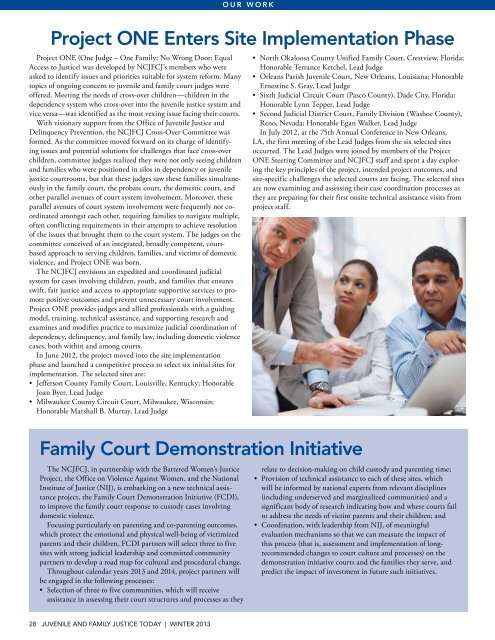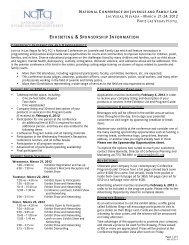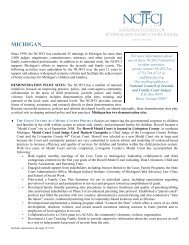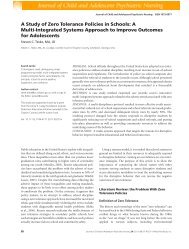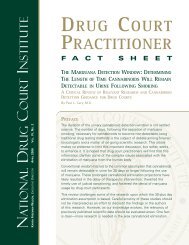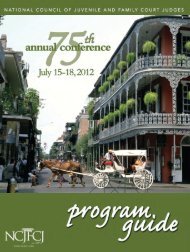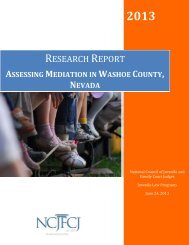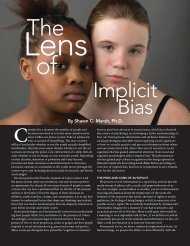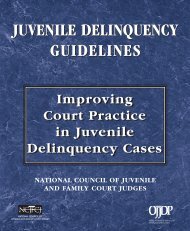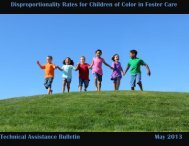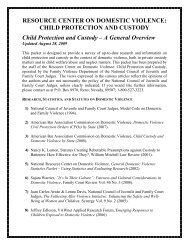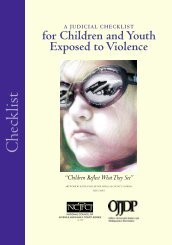dowNload - National Council of Juvenile and Family Court Judges
dowNload - National Council of Juvenile and Family Court Judges
dowNload - National Council of Juvenile and Family Court Judges
Create successful ePaper yourself
Turn your PDF publications into a flip-book with our unique Google optimized e-Paper software.
OUR WORK<br />
Project ONE Enters Site Implementation Phase<br />
Project ONE (One Judge – One <strong>Family</strong>; No Wrong Door; Equal<br />
Access to Justice) was developed by NCJFCJ’s members who were<br />
asked to identify issues <strong>and</strong> priorities suitable for system reform. Many<br />
topics <strong>of</strong> ongoing concern to juvenile <strong>and</strong> family court judges were<br />
<strong>of</strong>fered. Meeting the needs <strong>of</strong> cross-over children—children in the<br />
dependency system who cross-over into the juvenile justice system <strong>and</strong><br />
vice versa—was identified as the most vexing issue facing their courts.<br />
With visionary support from the Office <strong>of</strong> <strong>Juvenile</strong> Justice <strong>and</strong><br />
Delinquency Prevention, the NCJFCJ Cross-Over Committee was<br />
formed. As the committee moved forward on its charge <strong>of</strong> identifying<br />
issues <strong>and</strong> potential solutions for challenges that face cross-over<br />
children, committee judges realized they were not only seeing children<br />
<strong>and</strong> families who were positioned in silos in dependency or juvenile<br />
justice courtrooms, but that these judges saw these families simultaneously<br />
in the family court, the probate court, the domestic court, <strong>and</strong><br />
other parallel avenues <strong>of</strong> court system involvement. Moreover, these<br />
parallel avenues <strong>of</strong> court system involvement were frequently not coordinated<br />
amongst each other, requiring families to navigate multiple,<br />
<strong>of</strong>ten conflicting requirements in their attempts to achieve resolution<br />
<strong>of</strong> the issues that brought them to the court system. The judges on the<br />
committee conceived <strong>of</strong> an integrated, broadly competent, courtbased<br />
approach to serving children, families, <strong>and</strong> victims <strong>of</strong> domestic<br />
violence, <strong>and</strong> Project ONE was born.<br />
The NCJFCJ envisions an expedited <strong>and</strong> coordinated judicial<br />
system for cases involving children, youth, <strong>and</strong> families that ensures<br />
swift, fair justice <strong>and</strong> access to appropriate supportive services to promote<br />
positive outcomes <strong>and</strong> prevent unnecessary court involvement.<br />
Project ONE provides judges <strong>and</strong> allied pr<strong>of</strong>essionals with a guiding<br />
model, training, technical assistance, <strong>and</strong> supporting research <strong>and</strong><br />
examines <strong>and</strong> modifies practice to maximize judicial coordination <strong>of</strong><br />
dependency, delinquency, <strong>and</strong> family law, including domestic violence<br />
cases, both within <strong>and</strong> among courts.<br />
In June 2012, the project moved into the site implementation<br />
phase <strong>and</strong> launched a competitive process to select six initial sites for<br />
implementation. The selected sites are:<br />
• Jefferson County <strong>Family</strong> <strong>Court</strong>, Louisville, Kentucky; Honorable<br />
Joan Byer, Lead Judge<br />
• Milwaukee County Circuit <strong>Court</strong>, Milwaukee, Wisconsin;<br />
Honorable Marshall B. Murray, Lead Judge<br />
• North Okaloosa County Unified <strong>Family</strong> <strong>Court</strong>, Crestview, Florida;<br />
Honorable Terrance Ketchel, Lead Judge<br />
• Orleans Parish <strong>Juvenile</strong> <strong>Court</strong>, New Orleans, Louisiana; Honorable<br />
Ernestine S. Gray, Lead Judge<br />
• Sixth Judicial Circuit <strong>Court</strong> (Pasco County), Dade City, Florida;<br />
Honorable Lynn Tepper, Lead Judge<br />
• Second Judicial District <strong>Court</strong>, <strong>Family</strong> Division (Washoe County),<br />
Reno, Nevada; Honorable Egan Walker, Lead Judge<br />
In July 2012, at the 75th Annual Conference in New Orleans,<br />
LA, the first meeting <strong>of</strong> the Lead <strong>Judges</strong> from the six selected sites<br />
occurred. The Lead <strong>Judges</strong> were joined by members <strong>of</strong> the Project<br />
ONE Steering Committee <strong>and</strong> NCJFCJ staff <strong>and</strong> spent a day exploring<br />
the key principles <strong>of</strong> the project, intended project outcomes, <strong>and</strong><br />
site-specific challenges the selected courts are facing. The selected sites<br />
are now examining <strong>and</strong> assessing their case coordination processes as<br />
they are preparing for their first onsite technical assistance visits from<br />
project staff.<br />
<strong>Family</strong> <strong>Court</strong> Demonstration Initiative<br />
The NCJFCJ, in partnership with the Battered Women’s Justice<br />
Project, the Office on Violence Against Women, <strong>and</strong> the <strong>National</strong><br />
Institute <strong>of</strong> Justice (NIJ), is embarking on a new technical assistance<br />
project, the <strong>Family</strong> <strong>Court</strong> Demonstration Initiative (FCDI),<br />
to improve the family court response to custody cases involving<br />
domestic violence.<br />
Focusing particularly on parenting <strong>and</strong> co-parenting outcomes,<br />
which protect the emotional <strong>and</strong> physical well-being <strong>of</strong> victimized<br />
parents <strong>and</strong> their children, FCDI partners will select three to five<br />
sites with strong judicial leadership <strong>and</strong> committed community<br />
partners to develop a road map for cultural <strong>and</strong> procedural change.<br />
Throughout calendar years 2013 <strong>and</strong> 2014, project partners will<br />
be engaged in the following processes:<br />
• Selection <strong>of</strong> three to five communities, which will receive<br />
assistance in assessing their court structures <strong>and</strong> processes as they<br />
relate to decision-making on child custody <strong>and</strong> parenting time;<br />
• Provision <strong>of</strong> technical assistance to each <strong>of</strong> these sites, which<br />
will be informed by national experts from relevant disciplines<br />
(including underserved <strong>and</strong> marginalized communities) <strong>and</strong> a<br />
significant body <strong>of</strong> research indicating how <strong>and</strong> where courts fail<br />
to address the needs <strong>of</strong> victim parents <strong>and</strong> their children; <strong>and</strong><br />
• Coordination, with leadership from NIJ, <strong>of</strong> meaningful<br />
evaluation mechanisms so that we can measure the impact <strong>of</strong><br />
this process (that is, assessment <strong>and</strong> implementation <strong>of</strong> longrecommended<br />
changes to court culture <strong>and</strong> processes) on the<br />
demonstration initiative courts <strong>and</strong> the families they serve, <strong>and</strong><br />
predict the impact <strong>of</strong> investment in future such initiatives.<br />
28 JUVENILE AND FAMILY JUSTICE TODAY | WINTER 2013


